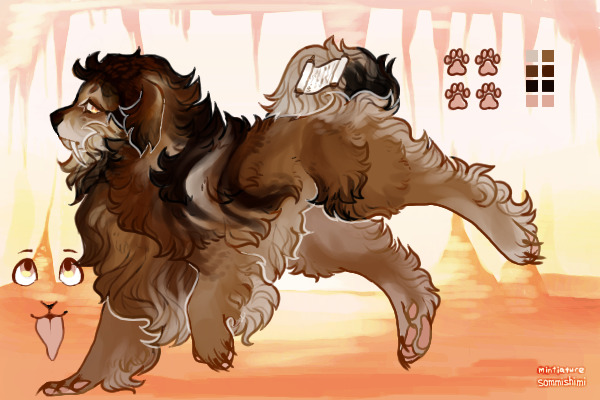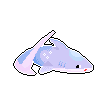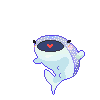
shibeboi||fernwood||male
When he woke up, it was cold. He was alone. He was only just a kit.
Not knowing any language, he made a series of yelps, hoping someone would find him.
Soon, after maybe about fifteen minutes of helpless yelping, his calls got answered. Strange, mammal like creatures appeared in front of him. These creatures were dark and fluffy like him, but they had round ears and big, blue eyes. They communicated in a sort of chirping noise.
 art by Mainstay⊕Medic
art by Mainstay⊕MedicThey took the little kit under their wing, and taught him everything about this world. He leaned to communicate with these creatures, and they gave him a name: Fernwood. Although they don't speak our language, that's what it would translate to. He was named after a certain type of tree there, that had fluffy bark and dark leaves.
~what it's like~
This strange world is full of black crunchy stuff, which seemed to be the source of the cold. It's snow.
Yes, the snow is black. This phenomenon is caused by humid and fulvic acids in the water. The water evaporates, and comes down as snow, making the snow, the ice and all the water black. It's still safe to drink.
This world is very flat, which is good for Fernwood's pack. They are nomads, so the flat terrain makes that easier for them to travel.
The sky in this world is a dark blue/purple. This happens because the blue particles in the light become darker once they enter the atmosphere, making their eyes see the sky as dark blue/purple.
The snow never seems to really melt. It would be like Earth's Antarctica.
This planet is roughly the size of Neptune. Fernwood has only seen part of it, but he can assume that the rest of the planet is frozen as well.
~creatures~
This world is full of dark creatures, that adapted to their dark environment. If you have light fur, you are prone to being hunted.
Most of these creatures are covered in thick, warm fur that protects them from the harsh cold. All of these creatures are warm-blooded, because no cold-blooded creature could survive here.
There's of course the round-eared blue-eyed mammal-like creatures that "adopted" Fernwood. These creatures are very social, and travel in packs. These packs can have as little as five of these creatures, or as much as twenty. They are known to take in abandoned babies and raise them.
They are omnivorous. Most of the creatures on this planet are, because it's easiest and most practical.
They communicate in a sort of chirping noise. Each one has their own "name", which is a series of chirps and squeaks, unique to the name.
They are very intelligent: they seem to communicate in a human-like way. They talk, just for the sake of talking.
They feel emotions as well, such as sorrow when one has been killed, or happiness when they see the young ones playing.
There are not set amount of males of females in the groups. There is also no alpha. They are intelligent enough to get along without a leader and make collective decisions.
Everyone helps care for the young. The males usually go hunt while the females watch the young, but sometimes it's the other way around.
In their language, they have names for every creature, plant and thing.
They are about the size of a German Shepard
-
There are little white rodents who run around in abundance in this world. Because of their light coloration and huge population, they are easy targets for food.
These creatures are very dumb, only wanting two things: to eat and to reproduce. This also makes them easy to catch.
They are usually solitary, only coming together to mate. They, too, have heavy fur.
They have a really distinct smell. It resembles mustard. This makes them easy to track.
They have very small ears, so they can't hear very well. Again, makes them ideal prey.
The females usually leave the babies as soon as they're born
They are mostly vegetarian. The only way they eat any type of meat is by killing the smaller ones of their type.
-
There are much larger predators also. Much larger then the creatures who adopted Fernwood, these creatures are very large and very aggressive. They are very much like a bear in terms of attitude and diet. The only difference really is size. The smallest of these creatures is about the size of a grizzly. They are the biggest creatures on this planet.
They are very protective of their young. If anything gets ten feet from one of their babies, they charge and, in most circumstances, kill whatever was that close.
They feed on any other animal, and most of the vegetation. Their aggressiveness is key to the survival of them and their young.
They are also mainly solitary. The mothers keep the babies until they are old enough to be on their own. She will die protecting them if she has to.
These, like most other species, are covered in head to toe in thick, dark fur. They have long, lion like tails and very sharp teeth. They all have a lighter marking on their foreheads, in the shape of a heart. They have long, droopy ears.
They can't see very well. That marking helps them tell each other apart. They mainly use their sense of smell while hunting.
-
Now, there's the question among Fernwood's pack about what he is. They have never seen his biological parents, or any creature that resembles him. The key thing that sets him apart is this sort of shiny thing on his tail. They have hunted for his parents, who would presumably have the same thing on their tails. But they haven't found a single trace of them.
Maybe they are on the other side of this world. Maybe they were the last ones of this species and died right after giving birth to Fernwood. There are plenty of theories like this, but Fernwood doesn't seem to care. He never met his biological parents, and was quite satisfied where he is.
There are many other creatures of course, but I don't want to bore you!
~vegetation~
There is a wide variety of vegetation on this planet, despite the cold temperatures.
There's the Fernwood trees: large, thick trees with furry bark and dark leaves. These trees are often hollowed out by the creatures that live here, and are turned into a temporary burrow. The fur on the bark helps keep the inside of the tree warm.
These trees produce a sap at certain times. This sap is very sweet, and high in protein. You don't need very much of it to be full.
-
There are bushes of red berries everywhere. They are actually two types of berries. One type is edible; and tastes like cranberries. One is poisonous, and will kill you in a matter of minutes. Before eating the berries, one must break a berry open that they took from the bush. If the inside is a pinkish color, your good to go. If it's black inside, it's the poisonous kind.
-
Inside the lakes (that aren't frozen) there is a sort of lake weed that is also edible. Because it lives in the black water, it turned black as well. Fernwood's pack will often make meals out of berries, meat and this lake weed.
-
There is grass buried under the snow that somehow stays alive. This grass is green, a bright lime green. The vegetarian creatures will dig under the snow for the sweet grass.
-
There are leaves on a certain type of tree that taste like butterscotch (although the inhabitants of this planet don't know that). These leaves grow on a tree that can only be found underground. Yes, you must travel in caves to find this plant. It doesn't need sunshine to grow, like mushrooms, and prefers the dark, clamminess of the caves.
The bark and leaves of the tree have really good healing abilities. The smarter species on this planet will often give it to sick/injured creatures, and it works miracles.
They have tried to harvest it and plant it outside, but the sun seems to shrivel it up, killing it.
-
Once again, there is much more plant life on this plant, just don't want to bore you by describing them all:
~days, months and years~
The way the days, months and years are separated is very much like Earth. Although they can't tell time, the most intelligent creatures have a decent understanding of night and day.
-
Of course, like a lot of other planets, it gets dark at night and light in the day.
There is also no moon. The stars surrounding the planet are really bright, giving off enough light to be able to see at night.
They can tell months by the Fernwood trees. There's the shedding month, where the trees shed their fur and grow new fur. There's the leaf month, where the leaves get temporarily lighter. And there's the normal month, where everything is normal. And after going through these cycles, a year on the planet has passed.
~seasons~
There doesn't really seem to be seasons on this planet. The snow and berries stay all year, never seeming to go away. The fauna never seems to migrate and the days don't really get longer or shorter. The only way they tell that it's been a year is by the three cycles of the Fernwood trees.
~solar system~
This planet's solar system isn't that different then ours. There is of course a sun that gives off light and warmth. There is, however, no moon. The surrounding stars are close enough to give off the same amount of light the moon would.
-
This planet is the last in the solar system's "row" of planets, meaning it's the coldest. There are eleven other planets, each closer to the sun.
If you had the chance to visit this planet, look up at night. You may see colors dancing around at night, of all the color of the rainbow. These are the Aurora Borealis. The beautiful ribbons, that look magical. Fernwood and his pack often gather around and watch them, telling stories in their own language.

~natural disasters~
As beautiful as Fernwood's world is, it also has it's fair share of dangers that send every creature running.
First of all is the snow storms. These snow storms can reach temperatures up to -60 degrees Celsius. If a creature wasn't properly equipped (thick fur) then they would be frozen where they stand. The more social creatures usually all huddle together in one big, thick ball of fur. The more solitary creatures, however, seek refuge underground (if it's not already too frozen) or in caves. These storms can last any period of time between 10 minutes to an hour and a half. The black snow, when combined with raging winds and dark clouds, makes vision nearly impossible. You have to try your best to stand your ground, or you could end up lost in the storm.
-
Next are the earthquakes. Like Earth, this planet has tectonic plates underneath the ground that move around. There is space between these plates, and when they collide, they make an earthquake. These earthquakes are exactly identical to the ones on earth, with varying magnitudes and damage caused. In these situations, the creatures all run to a big, open space with no trees or mountains and wait it out. These earthquakes aren't very fatal to the creatures on this planet.
-
With earthquakes come tsunamis. Giant waves that are formed when an earthquake happens underwater. Now, since there is so much water in the planets oceans, it doesn't freeze. It instead turns into very cold water that can most definitely give you hypothermia. This planet is full of oceans, all black and menacing. When tsunamis happen, it's even more deadly than here on earth. If you happen to fall in the water, the temperature will cause your muscles to freeze up and will result in you drowning. As any other tsunami, they are very destructive. The only way to survive them is to get to very high, sturdy ground such as a mountain or a very tall hill. You can't outrun them.
-
Next are the avalanches. Not really a natural disaster, but dangerous none the less. In this world of snow, they are very common. No time to react, or even think. One moment, your walking by a mountain, maybe enjoying the view or hunting for food. The next moment, you find yourself under a layer of frozen darkness, paralyzed, unable to escape. All you can do is hope for someone to find you in time. The most intelligent creatures take precautions when traveling by the mountains. Always go in pairs, be alert, and always take the safe route. It's amazing how much they adapted to this environment. Unfortunately, even with these precautions in place, avalanches are still very deadly and loads of lives are lost to them.
-
Forest fires. You would think that, in a world of snow, fire wouldn't exist. Well you would be wrong. During the snow storms, there is occasionally lightning that strikes. More often than not, it doesn't reach the ground. But when it does, it starts a massive fire. The fire doesn't spread easily, but it's enough to warn everyone to get the heck out. The fires don't usually last long, as the wood is very moist. Even so, they can be disastrous.
~Illnesses and other~
Not only are there fierce predators, unforgiving cold and merciless natural disasters that you have to worry about, but there is also illnesses and other life-threatening body phenomenons to worry about.
Hypothermia. The most common cause of death on this planet, for obvious reasons. It's mostly the young creatures who aren't really properly equipped for the cold that fall victim to this. The creatures that travel in packs usually all huddle together, with the youngest ones on the inside and the oldest on the outside, to keep them warm. There are also very, very cold bodies of water around, such as rivers, lakes and oceans. These bodies of water can't freeze over. If one happens to fall in, there is no saving them. If they don't drown, they will surely die from hypothermia, as they can't warm themselves up with wet fur.
-
This planet has many sicknesses that we have, like the flu and the common cold. On Fernwood's planet, these are much more fatal than on Earth. Their immune systems aren't like ours, they haven't adapted to these sicknesses yet. They don't have medicine, except the plant that grows in the caves. But that plant is extremely rare, and doesn't have a guaranteed chance of success. So if you get a cold or the flu, your practically a goner. There's just nothing to do.
There is this strange disease that goes around. This disease, or whatever it is, will slowly start to make your fur go white. It starts out in streaks, and it continues until the creature sheds their fur, which is the same time the fernwood trees shed. Your fur then becomes normal again. Strangely enough, it doesn't affect Fernwood. Nobody can tell if it affects the white rodents.
~
~conclusion~
Fernwood is quite aware that he is not the same species as his pack. He can also tell that he thinks and acts quicker. But he is happy where he is. And who knows, maybe one day he will find his parents. Or somebody that knows who he is and where he came from. I guess he just has to wait.
-
2,626 words and 14,593 characters.

Thank you for giving me the chance to enter! Please know that even if my writing and art aren't the greatest, that I put my best effort into this! Goodluck all!





























